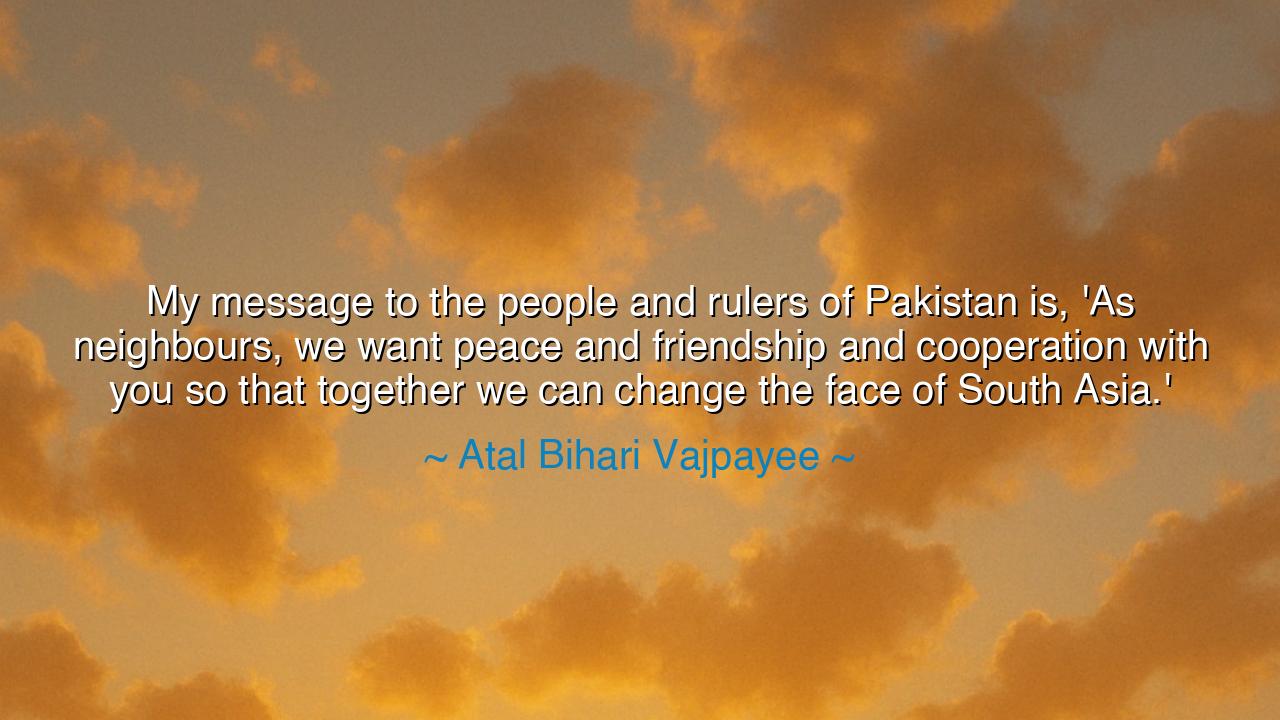
My message to the people and rulers of Pakistan is, 'As
My message to the people and rulers of Pakistan is, 'As neighbours, we want peace and friendship and cooperation with you so that together we can change the face of South Asia.'






Hear the noble words of Atal Bihari Vajpayee, poet, statesman, and one of the most eloquent voices of peace in modern India, who declared: “My message to the people and rulers of Pakistan is, ‘As neighbours, we want peace and friendship and cooperation with you so that together we can change the face of South Asia.’” These words, born from the heart of a leader who had seen both war and reconciliation, resound not merely as diplomacy, but as prophecy — a vision of what the subcontinent could be if only it chose unity over division, compassion over rivalry, and shared destiny over inherited hatred. Vajpayee’s message is not just to nations — it is to humanity itself: that peace is not weakness, but the highest form of strength; that friendship between foes is a divine act of courage.
To understand the origin of this quote, we must travel back to the late 1990s, a time when India and Pakistan stood at the brink of conflict yet again. Decades had passed since Partition, and the wounds of separation still bled in the hearts of millions. Yet amidst this tension, Atal Bihari Vajpayee, then Prime Minister of India, chose the path of dialogue over discord. In 1999, he embarked on his historic Lahore Bus Journey, crossing the border not as a conqueror, but as a messenger of goodwill. It was there, standing on the soil that once shared its roots with India’s own, that he uttered these immortal words — an invitation to heal, to rebuild, to dream anew of a South Asia where nations cooperated not in fear, but in friendship.
In those days, his gesture was both revolutionary and risky. The world watched as Vajpayee extended his hand to Pakistan’s Prime Minister Nawaz Sharif, offering not rhetoric but genuine reconciliation. He believed that the two nations, bound by history, culture, and blood, could become partners in prosperity — that cooperation in trade, culture, and development could transform a region long scarred by suspicion. His was a call to transcend the bitterness of the past, to embrace a future where peace would not merely be the absence of war, but the presence of justice, empathy, and shared progress. This was the dream he carried — that together, India and Pakistan could, indeed, change the face of South Asia.
The ancients, too, spoke of such wisdom. In the Upanishads, it is written: “Let us live together, let us eat together, let us be vital together, let us be radiant together.” These words, centuries old, mirror Vajpayee’s vision — for peace is not found in isolation but in cooperation. Even the great Emperor Ashoka, once a warrior drenched in blood, came to understand this truth after the battle of Kalinga. He laid down his sword, proclaiming that the conquest of hearts through compassion was greater than the conquest of lands through war. In this lineage of enlightened leaders stands Atal Bihari Vajpayee — a modern Ashoka, whose weapon was not steel, but speech; whose battlefield was not the border, but the human heart.
Yet, as history reminds us, such vision often meets resistance. Soon after the Lahore peace initiative, the Kargil conflict erupted — a cruel test of Vajpayee’s faith in reconciliation. Many might have turned bitter, forsaken the path of peace, and hardened their hearts. But Vajpayee did not. Even after war had once more darkened the sky, he spoke again of friendship and cooperation. His belief was unbroken: that true leadership does not waver in the face of betrayal, for peace must be pursued not because it is easy, but because it is right. Like a sage of old, he understood that vengeance feeds the fire of ruin, while forgiveness sows the seeds of renewal.
The lesson of Vajpayee’s words reaches beyond the borders of India and Pakistan. It speaks to every conflict — between nations, between communities, even between individuals. Peace is not the gift of the powerful; it is the duty of the wise. To seek friendship with one’s adversary requires greater bravery than to wage war against them. And to extend one’s hand when the other may still hold a sword is an act of spiritual strength — the mark of one who understands the deeper laws of the universe: that hate divides, but compassion endures.
Therefore, dear listener, carry Vajpayee’s message into your own life. Where there is division, sow understanding. Where there is bitterness, offer grace. In your families, your communities, your nations — be the bridge, not the barrier. Work not for victory over others, but for harmony with them. For when neighbours become friends, when cooperation replaces conflict, then the destiny of all humankind is uplifted. As Atal Bihari Vajpayee proclaimed, let our way be clear — the way of peace, friendship, and cooperation. Only then shall we truly change not just the face of South Asia, but of the world itself.






AAdministratorAdministrator
Welcome, honored guests. Please leave a comment, we will respond soon